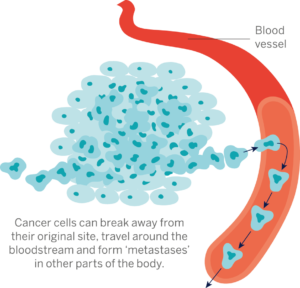Blocking prostate cancer signals
Project Summary
About the Researchers
Dr Toby Phesse
Principal Investigator
Dr Phesse has been studying how Wnt signalling regulates the initiation and growth of cancer for many years. He did his PhD at University of Warwick investigating the role of Wnt signalling during embryonic development, and during this time learnt that Wnt signalling was activated during many cancers. He then secured a job at Cardiff University analysing how Wnt signalling regulated the initiation and progression of cancer, including prostate cancer. He currently leads the Cell Signalling and Cancer Laboratory at Cardiff, and has an honorary position at University of Melbourne, in which Wnt signalling is a central theme. Around ten years ago, Dr Phesse became interested in the requirement for Wnt receptors called Fzd during stem cell function and cancer, and identified Fzd7 as a key receptor transmitting oncogenic Wnt signalling in gastric cancer. Interestingly Wnt ligands and receptors are observed to be deregulated more in metastatic prostate cancer than the primary tumour which has led to this area of research to determine the therapeutic benefit of targeting this aspect of Wnt signalling for metastatic prostate cancer and investigate at what stage of metastasis Wnt is required in prostate cancer.
Dr Helen Pearson
Principal Investigator
Dr Pearson undertook her PhD at Cardiff University before undertaking her post-doctoral work at the Peter MacCallum Cancer Centre in Melbourne, Australia. Currently, Dr Pearson leads the prostate cancer translational research group at the European Cancer Stem Cell Research Institute at Cardiff University. Her research integrates basic cancer biology, biomarker discovery and the preclinical assessment of novel therapeutic approaches, with the ultimate goal to improve patient care. Having previously studied the role of polarity, PI3K, RAS and Wnt signalling in prostate cancer, her current research will explore targeting the Wnt pathway to treat advanced prostate cancer that has spread to distant organs. Ultimately, this work aims to identify new therapeutic approaches and prognostic markers for prostate cancer, which are urgently needed in the clinic.
Dr Valerie Meniel
Post-doctoral Researcher
Dr Meniel is a post doc researcher working in Cardiff university. She has a strong background in studying Wnt signalling in cancer. Using in vivo models Dr Meniel has identified many important molecular mechanisms involved in the initiation and growth of gastrointestinal cancer. More recently she has been focusing on finding new therapies that target signalling pathways. In this new project Valerie will focus on using the most clinically relevant models of metastatic prostate cancer to test if targeting the Wnt pathway can block metastasis to the bone.
The spread of prostate cancer
There are trillions of cells in the human body which are continuously renewing themselves to replace old or damaged tissue.
When this renewal process gets out of control and begins to invade healthy tissue, it is called cancer. Cancer cells can break away from their original site, such as the prostate, travel around the bloodstream and settle in other parts of the body, forming ‘metastases’ or ‘secondary tumours’. Prostate cancer often spreads to bone. This can be very painful and many men who die of prostate cancer have secondary tumours in bone.


The Wnt pathway
It is important for the cells in our body to be able to communicate with each other.
The way that cells communicate is called cell signalling and it enables them to work together and react to any changes to the environment. For example, when we think we could be in danger, our adrenal glands produce adrenaline, which then sends the message to the other cells in our body to prepare for a fight or flight response.
The Wnt pathway is a set of signals that has been shown to play a key role in prostate cancer. Wnt signals are released by cells and taken up by surrounding cells, causing them to grow and move uncontrollably. This can result in cancer growth and spread.
The research team hope that drugs blocking Wnt signalling could be used to treat prostate cancer and offer new treatments to those people who have no other options.
They will investigate whether these drugs can be used to prevent prostate cancer from spreading, treat prostate cancer that has already spread and perhaps even delay or prevent resistance to current therapies.
The research project
Dr Phesse and Dr Pearson hope to learn how Wnt controls prostate cancer spread and discover whether blocking the pathway prevents spread. There is already a drug that blocks the Wnt pathway being tested in patients with other cancers. They will investigate whether this drug could also be used to treat advanced prostate cancer.
The researchers are particularly interested in how prostate cancer cells spread to bone, which is one of the big unanswered questions in prostate cancer research. As part of this project, they will investigate how the Wnt pathway contributes to this spread and identify which genes are important for the establishment of bone metastases.

This project will also address key questions regarding the role of Wnt signalling in the spread of prostate cancer to bone, including, ‘Is Wnt signalling required to promote the growth and movement of prostate cancer cells when they arrive in the bone?’
Furthering our knowledge of how prostate cancer cells spread and grow in bone is incredibly important, and the results could be used to design future research projects that will lead to better outcomes for prostate cancer patients.
““We are delighted that PCR have funded this project which will allow us to determine if drugs targeting Wnt signalling, which is active in advanced/metastatic prostate cancer, can block the spread of prostate cancer cells around the body. Metastasis is a complex process where cancer cells spread to distant sites and form new tumours, however we don’t have a good understanding of the biology underpinning this process. To improve our understanding of prostate cancer metastasis, we will also investigate how Wnt signalling is being transmitted in prostate cancer cells, and how it impacts the ability of prostate cancer cells to grow in the bone– a frequent site for prostate cancer metastasis."
Dr Toby Phesse and Dr Helen Pearson
Cardiff University







